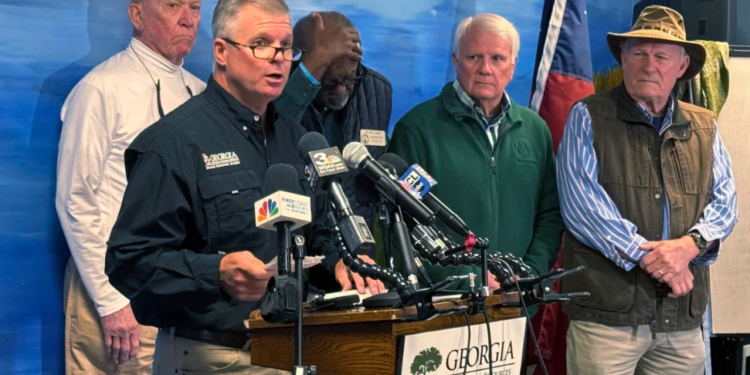Oct 21, 2024 Story by: Editor
SAVANNAH, Ga. — Georgia authorities announced on Sunday that they are investigating the tragic collapse of a dock gangway that resulted in the deaths of seven people. The incident occurred on an island along Georgia’s Atlantic coast, during a gathering held by the Gullah-Geechee community, descendants of enslaved Africans.
Georgia Department of Natural Resources Commissioner Walter Rabon stated at a news conference that the collapse was due to a “structural failure.” He added, “There should be very, very little maintenance to an aluminum gangway like that, but we’ll see what the investigation unfolds.” The accident took place on Sapelo Island, a day before the press conference, and left three others critically injured.
The gangway, which was installed in 2021, failed during the island’s Cultural Day event, which drew about 700 people. The island is located approximately 60 miles south of Savannah and 7 miles from the mainland. With no bridge access, visitors rely on a ferry to reach the island, known for its Gullah-Geechee community, descendants of enslaved people who lived on Thomas Spalding’s cotton plantation.
Rabon reported that around 40 people were on the gangway at the time, and at least 20 fell into the water. The gangway connected an outer dock, used for boarding ferries, to the onshore dock. Additional staff were present due to the large crowd, with 40 workers on duty. After the collapse, the U.S. Coast Guard, along with local sheriff and fire departments, responded quickly, using boats and helicopters for the rescue efforts.
Ferry worker recounts tragic moments
Ed Grovner, a senior mate on one of the ferries, told The Associated Press that they arrived shortly after the collapse. Grovner described the scene as life jackets floated in the water and crew members tried to assist two victims. Sadly, both had already passed away. “I couldn’t sleep last night,” Grovner shared, recounting how he struggled with feelings of helplessness. “My wife said I was sleeping, I was hollering in my sleep, saying, ‘I’m going to save you. I’m going to save you. I’m going to get you.’”
A devastating blow to the Gullah-Geechee community
Sapelo Island is one of several coastal communities where descendants of enslaved Africans, known as Gullah or Geechee, live. These communities, spread from North Carolina to Florida, have preserved much of their African heritage due to their historical isolation. Hogg Hummock, home to several dozen Black residents, was the focus of Saturday’s Cultural Day event, featuring quilting and fishing net demonstrations, along with traditional island dishes such as smoked mullet and gumbo.
Resident Jazz Watts, who was at the festival when the gangway collapsed, described the chaotic aftermath. He saw both civilians and emergency responders pulling people from the water, with some victims covered in blankets after unsuccessful resuscitation attempts. “It’s devastating,” Watts said. “When you see people being carried that are wrapped in blankets and they have died; it’s traumatizing to everyone.”
Bystanders form a human chain to save victims
Reginald Hall, another resident, jumped into the water to help, noting the strong current pulling victims toward the ocean. He described a human chain that was formed to pass victims to safety, including a 2-year-old child. Hall also assisted in carrying bodies wrapped in blankets from the water. “It was chaotic,” Hall remarked. “It was horrible.”
JR Grovner, another witness, transported an injured woman in a pickup truck to a field where helicopters were evacuating victims. He noted that the tall grasses on the ground hid holes dug by wild boars, making the journey even more challenging.
Long-standing concerns about island safety infrastructure
Sapelo Island residents previously sued McIntosh County and the state of Georgia, claiming inadequate emergency services and medical facilities. A settlement in 2022 resulted in plans to build a helicopter pad on the island, but according to Hall, Watts, and JR Grovner, the project is still incomplete.
The ferry dock was rebuilt in 2021 following another legal settlement. In that case, island residents argued that the state-operated ferry boats and docks did not comply with federal accessibility standards. Grovner recalled raising concerns about the gangway’s sturdiness just months before the collapse, but no action was taken. Rabon stated he had not been made aware of these complaints.
Community’s historical significance and ongoing challenges
Hogg Hummock, also known as Hog Hammock, was placed on the National Register of Historic Places in 1996. Despite this recognition, the community has been dwindling for decades, with some families selling land to outsiders who build vacation homes. Recent zoning changes in 2023, which doubled the allowable size of homes, have led to concerns that higher property taxes will force longtime residents to sell off land held by their families for generations.
None of the seven deceased were island residents, Rabon confirmed. One of the victims was identified as Charles Houston Jr., a chaplain with the Natural Resources agency.
Investigation into the gangway collapse
A team of investigators, including experts in engineering and accident reconstruction, arrived on Sapelo Island Sunday to investigate the cause of the gangway’s failure. They are receiving assistance from the Georgia Bureau of Investigation.
Despite the tragic incident, the tight-knit community remains resilient as authorities work to determine what led to the catastrophic collapse of the gangway. Source: NPR

















